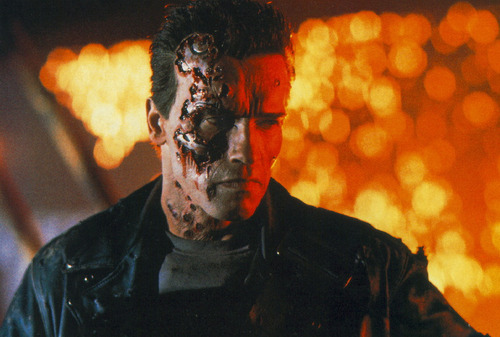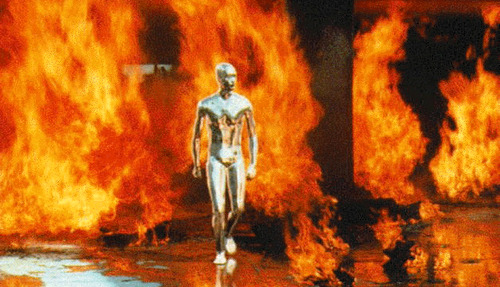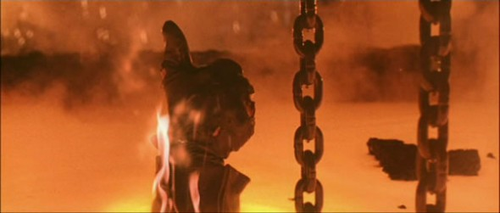
Since its $242 million release, I've directed an outlandish amount of ire at James Cameron's space-cats extravaganza, Avatar. But I wasn't always, in the words of South Park, a cynical asshole that hated everything.
I'm sure that, on a subconscious level, part of my frustration is that in my younger years, I absolutely loved Cameron's work. I loved The Abyss, which is basically the same movie asAvatar, except there are characters instead of caricatures. I love the thrilling horror-adventure Aliens, even though it's a complete tonal departure from the superior original. But the most amazing Cameron film of them all, though, is without a doubt one of the greatest action movies ever made — Terminator 2.
In the summer of '91, T2 was everywhere. Posters for the movie were ubiquitous, and my Saturday morning cartoons were packed with ads for various Arnold-shaped toys: action figures, video games, playsets where you could mold "flesh" onto a hellish endoskeleton. The movie looked incredible. "Hasta la vista, baby" was on the tip of pop culture's tongue. I was certain I was the only person on the planet who didn't see it, and that by all accounts, it was the greatest thing to strike the silver screen since the creation of celluloid.
But for a long time, my parents were fairly strict about the amount of television and types of movies I was allowed to see. Even The Simpsons was verboten. So an ultra-violent epic about time-travelling robots that shoot and stab scores of innocent bystanders, all in the interest of either preventing or ensuring a horrifically-depicted nuclear apocalypse, would probably not get past my parental censors.
So I did what any kid would do. I saw it on VHS at my cousin's house.

Terminator 2 was a smash hit when it was released twenty years ago, and rightfully so. It works as a standalone film — I didn't see the original until the late 90s — and it blends exhilarating action sequences with a fascinating backstory (see: time traveling killer robots) that is flush with Cameron's wry sense of humor and his typical moral takeaways of the importance of humanity. As an adult, I'm still thrilled by the chases and shoot-outs, impressed by the restrained use of nearly-seamless CGI, and am amazed that I don't groan cynically when Sarah Connor tells us that if "a machine, a terminator, can learn the value of a human life, maybe we can, too."
The message works — and, in turn, elevates the entire movie, because it is not a tacked-on sentiment. The value of human life is a theme that plays from the very first frames, when a typical hot day in LA is transformed into the skeleton-littered battlefield of tomorrow.
Sarah Connor knows it's coming, what's at stake, and that any collateral damage before August 29th, 1997 wouldn't be a big deal after the entire world was turned to ash and twisted rebar. The source of her transformation to a restrained optimist by the film's end (aside from the obvious thrill of averting future catastrophe) is that a machine identical to the one sent to kill her in the first movie (except this one has eyebrows) is taught by a boy that killing is wrong. It's incredibly basic, but as John Connor teaches the machine grade-school lessons in humanity, Terminator 2 is elevated from an action horror flick to a sci-fi morality play.
On paper, the themes wouldn't impress a high school civics teacher. In the context of the storyworld, though, it's plausible. Even killer robots can learn empathy. It's something that a nine-year-old kid would find heart-achingly poignant.
When I was nine, it was heart-achingly poignant. I thought the film was an extraordinary feat — overwhelmingly exciting and thought-provoking without being (too) hokey. And I loved James Cameron for being able to do that in just over two hours with a directorial deftness that continues to impress me to this day.
Cameron never again captured my imagination the way he did with Terminator 2. In 1994, he taught us that Bill Paxton is a scumbag and Harrier jets exist; in 1997, he proved women love Leonardo DiCaprio. In late 2009, he showed us people will sit through anything so long as it's packaged well.
When I was a child, I was sad to see the terminator disappear in the vat, because it meant John Connor was losing the best chance he had for a stable father figure.
Now, when I see that thumb light on fire and slip below the surface, and the CPU shutting off for the last time, it reminds me of the last time I unconditionally loved the narrative work of James Cameron.

This piece was originally written as a part of the excellent 90's Nostalgia Series at The Junior Varsity, and was carefully edited by my dear friend Mike Placito.

